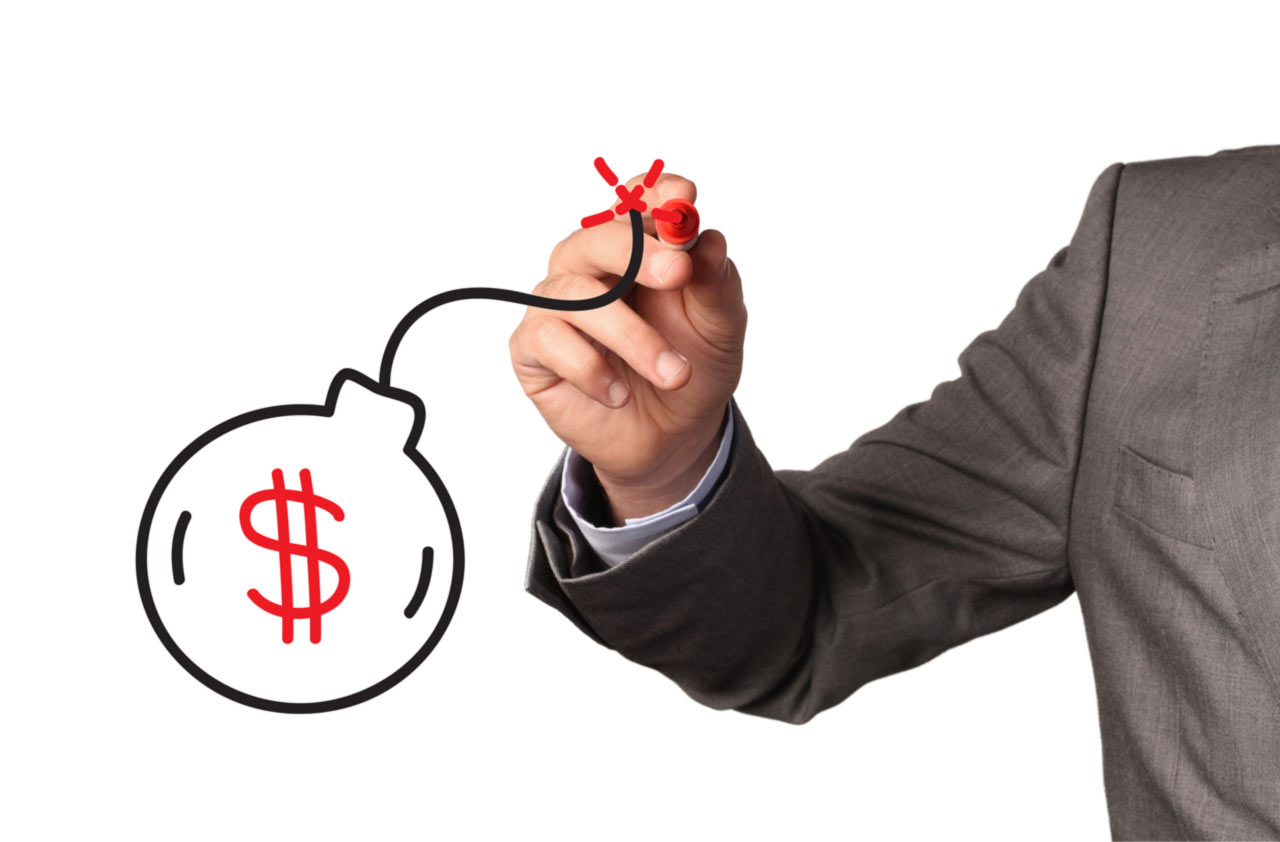Now Is the Time to Fend Off Problems With Your 401(k)-Focused Nest Egg
Tick, tick, tick. That's the tax time bomb on your 401(k) and IRA, quietly counting down. Here's how to defuse this explosive situation.


Profit and prosper with the best of Kiplinger's advice on investing, taxes, retirement, personal finance and much more. Delivered daily. Enter your email in the box and click Sign Me Up.
You are now subscribed
Your newsletter sign-up was successful
Want to add more newsletters?

Delivered daily
Kiplinger Today
Profit and prosper with the best of Kiplinger's advice on investing, taxes, retirement, personal finance and much more delivered daily. Smart money moves start here.

Sent five days a week
Kiplinger A Step Ahead
Get practical help to make better financial decisions in your everyday life, from spending to savings on top deals.

Delivered daily
Kiplinger Closing Bell
Get today's biggest financial and investing headlines delivered to your inbox every day the U.S. stock market is open.

Sent twice a week
Kiplinger Adviser Intel
Financial pros across the country share best practices and fresh tactics to preserve and grow your wealth.

Delivered weekly
Kiplinger Tax Tips
Trim your federal and state tax bills with practical tax-planning and tax-cutting strategies.

Sent twice a week
Kiplinger Retirement Tips
Your twice-a-week guide to planning and enjoying a financially secure and richly rewarding retirement

Sent bimonthly.
Kiplinger Adviser Angle
Insights for advisers, wealth managers and other financial professionals.

Sent twice a week
Kiplinger Investing Weekly
Your twice-a-week roundup of promising stocks, funds, companies and industries you should consider, ones you should avoid, and why.

Sent weekly for six weeks
Kiplinger Invest for Retirement
Your step-by-step six-part series on how to invest for retirement, from devising a successful strategy to exactly which investments to choose.
If you work for a company that still offers a pension, you’ve probably been told many times how lucky you are.
If you don’t and instead have a 401(k) or 403(b) through your employer, you may have realized by now that you may need to create your own luck. It’s up to you to help grow that money and then make it last through your retirement, and that’s no easy concept.
That wasn’t quite so obvious back in the early 1980s, when defined-contribution plans first came on the scene, and then later, when they began replacing defined-benefit plans.
From just $107.88 $24.99 for Kiplinger Personal Finance
Become a smarter, better informed investor. Subscribe from just $107.88 $24.99, plus get up to 4 Special Issues

Sign up for Kiplinger’s Free Newsletters
Profit and prosper with the best of expert advice on investing, taxes, retirement, personal finance and more - straight to your e-mail.
Profit and prosper with the best of expert advice - straight to your e-mail.
An Early Love Affair with 401(k)s
Though most workers would have preferred to keep their pension while adding a 401(k) as a separate perk — as some companies still do — the idea of having control over one’s own assets, with the potential to amass more wealth, has always been appealing. Plus, there was the enticement of the employer match, often touted as “free money.”
Workers were encouraged to start contributing to their 401(k)s as early as possible and to contribute as much as they could, and many did. It was easy, thanks to payroll deductions, and people liked that they didn’t have to pay taxes on that income — especially if they were high earners in a high tax bracket.
A Looming Tax Issue Later
But people seemed to forget they will owe some of that money to the IRS. They just keep letting those tax-deferred accounts grow, ignoring the fact that someday they’ll have to pay taxes on their contributions and earnings.
Those who do think about the tax aspects mostly assume that when they retire, they’ll have fewer expenses and less need for income, thus a lower tax rate than when they worked. That’s the conventional wisdom.
It hasn’t quite worked out that way, though. Unlike their parents and grandparents, who thought of retirement as a time to wind down and spend less, the Baby Boomers retiring now have no intention of slowing down. They don’t want to downsize their lifestyle; they want to add to it with travel, hobbies, concerts, dinners out, boats and vacation homes.
Which means that when they retire, many Baby Boomers need the same income or more, not less, and they end up in the same tax bracket or a higher one.
Worried About the Wrong Thing
I meet 401(k) investors who are worried about asset allocation and portfolio diversification every time the market goes up or down. What they don’t seem to consider when they look at their monthly statements is asset location and tax diversification.
Instead of separating their money into three tax buckets — one that’s taxed-deferred (IRAs, 401(k)s, 403(b)s), one that’s taxable (brokerage and bank accounts) and one that’s tax-free (Roth accounts and indexed universal life insurance) — they tend to keep almost all their wealth in the tax-deferred bucket. As a result, taxes are quietly eating away at their hard-earned nest egg.
And now, as the oldest Boomers are getting into their 70s, they’re also finding out about the impact that required minimum distributions (RMDs) can have. They feel as though they’ve been put in tax handcuffs — forced to withdraw and pay taxes on money they might not even need.
We’re actually starting to see people in their 70s who are paying more in taxes than when they were in their 60s. And they aren’t happy about it. This savings tool that was supposed to help workers build a better retirement could potentially jeopardize their lifestyle if they haven’t put a tax plan in place.
Take a Pre-Emptive Strike Now to Solve the Problem
There is a way to unwind the problem, however, and as with so many aspects of retirement planning, it’s all about timing.
Once you hit age 59½ and can access those funds without a penalty, it can make sense for 401(k)-focused savers to start shifting tax-deferred money to the tax-free bucket by converting some of it to a Roth IRA and/or indexed universal life insurance.
There’s no time like the present to get it done. Here’s why:
- If you retire entirely on taxable and tax-deferred income, you’ll be subject to the changes of the government. Many of the reforms passed in 2017 will sunset in 2025. It’s likely the government will raise tax rates at that point — if not sooner, if there’s a change in the administration.
- You also might lose some tax deductions in the future. We lost several deductions with the 2017 reform, and that could happen again. Most people also lose deductions as they age: when they pay off their home, their kids grow up and move out, or when one spouse dies.
- The government might tax more things. It’s pretty clear that there’s going to have to be some kind of Social Security reform in the future, and one answer could be to raise taxes.
I often ask the people I see, “In your heart of hearts, do you think taxes will be higher or lower 15 to 20 years from now?” Everybody says higher.
If that’s your expectation, why would you want all that money and growth in your tax-deferred bucket? Why wouldn’t you look at doing some tax planning now?
The Bottom Line for Your Plan
Even if you’re younger than 59½, you can do something to keep from paying more later. I encourage everyone to contribute to the employer match on their 401(k), but to also take advantage of today’s lower tax rates with a Roth IRA or Roth 401(k). You’ll pay taxes on your money on the front end, but once it’s in your account, the money will grow tax-sheltered. Then at retirement, qualified withdrawals will come out tax-free.
I come from Wisconsin, and there are lots of farms up there, so I’ll go with the old analogy that it’s usually smarter to pay taxes on the seed than the harvest.
If you’ve been carefully tending the money in your 401(k), you’ve likely watched it grow over the years. Don’t let it get away from you in retirement. Keep making your own luck and keep taxes in mind as you move forward.
Investment advisory services offered only by duly registered individuals through AE Wealth Management, LLC (AEWM). AEWM and Heise Advisory Group are not affiliated companies. Neither the firm nor its agents or representatives may give tax advice. Individuals should consult with a qualified professional for guidance before making any purchasing decisions. Heise Advisory Group is not affiliated with the U.S. government or any governmental agency. 614438
Kim Franke-Folstad contributed to this article.
The appearances in Kiplinger were obtained through a PR program. The columnist received assistance from a public relations firm in preparing this piece for submission to Kiplinger.com. Kiplinger was not compensated in any way.
Profit and prosper with the best of Kiplinger's advice on investing, taxes, retirement, personal finance and much more. Delivered daily. Enter your email in the box and click Sign Me Up.

Ken Heise is co-founder and president of the St. Louis-based Heise Advisory Group (www.heiseadvisorygroup.com). He is an Investment Adviser Representative and a Registered Financial Consultant, a designation awarded by the International Association of Registered Financial Consultants to advisers who meet high standards of education, experience and integrity.
-
 Dow Adds 1,206 Points to Top 50,000: Stock Market Today
Dow Adds 1,206 Points to Top 50,000: Stock Market TodayThe S&P 500 and Nasdaq also had strong finishes to a volatile week, with beaten-down tech stocks outperforming.
-
 Ask the Tax Editor: Federal Income Tax Deductions
Ask the Tax Editor: Federal Income Tax DeductionsAsk the Editor In this week's Ask the Editor Q&A, Joy Taylor answers questions on federal income tax deductions
-
 States With No-Fault Car Insurance Laws (and How No-Fault Car Insurance Works)
States With No-Fault Car Insurance Laws (and How No-Fault Car Insurance Works)A breakdown of the confusing rules around no-fault car insurance in every state where it exists.
-
 For the 2% Club, the Guardrails Approach and the 4% Rule Do Not Work: Here's What Works Instead
For the 2% Club, the Guardrails Approach and the 4% Rule Do Not Work: Here's What Works InsteadFor retirees with a pension, traditional withdrawal rules could be too restrictive. You need a tailored income plan that is much more flexible and realistic.
-
 Retiring Next Year? Now Is the Time to Start Designing What Your Retirement Will Look Like
Retiring Next Year? Now Is the Time to Start Designing What Your Retirement Will Look LikeThis is when you should be shifting your focus from growing your portfolio to designing an income and tax strategy that aligns your resources with your purpose.
-
 I'm a Financial Planner: This Layered Approach for Your Retirement Money Can Help Lower Your Stress
I'm a Financial Planner: This Layered Approach for Your Retirement Money Can Help Lower Your StressTo be confident about retirement, consider building a safety net by dividing assets into distinct layers and establishing a regular review process. Here's how.
-
 The 4 Estate Planning Documents Every High-Net-Worth Family Needs (Not Just a Will)
The 4 Estate Planning Documents Every High-Net-Worth Family Needs (Not Just a Will)The key to successful estate planning for HNW families isn't just drafting these four documents, but ensuring they're current and immediately accessible.
-
 Love and Legacy: What Couples Rarely Talk About (But Should)
Love and Legacy: What Couples Rarely Talk About (But Should)Couples who talk openly about finances, including estate planning, are more likely to head into retirement joyfully. How can you get the conversation going?
-
 How to Add a Pet Trust to Your Estate Plan: Don't Leave Your Best Friend to Chance
How to Add a Pet Trust to Your Estate Plan: Don't Leave Your Best Friend to ChanceAdding a pet trust to your estate plan can ensure your pets are properly looked after when you're no longer able to care for them. This is how to go about it.
-
 Want to Avoid Leaving Chaos in Your Wake? Don't Leave Behind an Outdated Estate Plan
Want to Avoid Leaving Chaos in Your Wake? Don't Leave Behind an Outdated Estate PlanAn outdated or incomplete estate plan could cause confusion for those handling your affairs at a difficult time. This guide highlights what to update and when.
-
 I'm a Financial Adviser: This Is Why I Became an Advocate for Fee-Only Financial Advice
I'm a Financial Adviser: This Is Why I Became an Advocate for Fee-Only Financial AdviceCan financial advisers who earn commissions on product sales give clients the best advice? For one professional, changing track was the clear choice.